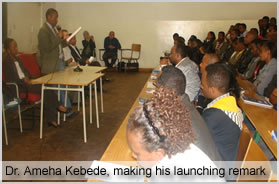EHNRI Launches National Food Consumption Survey

April 10, 2014
 The Ethiopian Health and Nutrition Research Institute (EHNRI) launches a National Food Consumption Survey, on June 10, 2010.
The Ethiopian Health and Nutrition Research Institute (EHNRI) launches a National Food Consumption Survey, on June 10, 2010.According to Dr. Ameha Kebede, A/Director General of EHNRI, who officially launches the survey, the survey is one of the National Nutrition Strategies, which believed to find the answers to major nutrition related question and provide guidance on the implementation of National Nutrition Strategy.
Dr. Ameha has also forwarded a directive to the survey’s data Collectors and Supervisors who have completed their 17 days intensive training at the same day, to be motivated in the data collection process as the collection, analysis and reporting of such kind serious data requires enthusiastic, interest and commitment.
According to Dr. Cherenet Aboye, Director of Food Science and Research Directorate, EHNRI, the survey which considered all regions in Ethiopia, covers 324 urban and rural enumeration areas and 8424 house holds to collect individual-level data on food consumption among regionally and nationally representative samples of young children and women in child-bearing years.
The survey that is believed to step up Ethiopia as one of the first countries in Africa to undertake such an important and detailed survey is designed to address suitable food vehicles for fortification that are consumed frequently and in sufficient quantities to have an impact on their nutritional status, where these foods are obtained, and the distribution of intakes of these foods, so that fortification does not put any high consumers at risk of toxicity.
It is known that, Malnutrition is a major public health problem in Ethiopia, particularly among young children and women. According to the 2009 EHNRI report, malnutrition, in the form of stunting, underweight and wasting were identified in 38%, 34% and 11% of children less than 5 years of age. Micronutrient deficiencies are known to be very high in some populations in Ethiopia, which have devastating and long lasting effects on the lives of young children that follow them into adulthood.
The launching session attracts representatives from the survey’s partner organizations that include the Ethiopian Federal Ministry of Health, Central Statistics Agency, the World Bank and Micronutrient Initiative.
